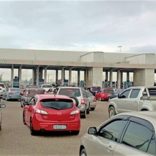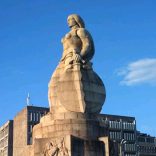Mozambique: Government approves state budget for 2026
Government promise to import 300 buses puts Chapas price hike on hold – Mozambique

Lusa (File photo)
The president of the Mozambican Federation of Road Transport Workers (Fematro) told Lusa on Thursday that the government had promised to import 300 buses to stop a fare increase threatened by carriers in urban centres.
The move comes nine years after a similar attempted fare increase triggered violent demonstrations.
This time, according to Castigo Nhamane, the executive and Fematro will study ways to make buses accessible to transporters, so that the cost burden is not carried by passengers.
“The commitment is that buses arrive in the country later this year and, with them, the transportation crisis in the main urban centres of the country will be mitigated,” Nhamane said.
With a fleet upgrade and at a discounted cost, the president of Fematro continued, it would be possible to alleviate the near-bankruptcy situation of Mozambican carriers.
“The subsidy the government has paid to transporters since 2008 is no longer useful, because it pays a negligible portion of the operating costs and has not saved the carriers from near-bankruptcy,” Nhamane said.
The allowance, he continued, was designed to mitigate the high cost of fuel for public transportation, but the business carries other expenses, which are becoming unbearable.
“The subsidy was introduced in 2008 for 2,500 vehicles, but currently 8,025 vehicles are registered at Fematro,” Nhamane said.
According to Nhamane, the 42 million meticais (EUR 584,000) that the executive channels to public private passenger carriers are a burden on state coffers and do not solve the chronic transportation problem.
“Even with the subsidy, a study we carried out in 2015 showed that a journey should cost 19 meticais (EUR 0.26), against the average of seven (EUR 0.09) and nine meticais (EUR 0.12) that it now costs in the major cities of the country, and over time the real cost must have tripled,” he added.
Even with the arrival of new buses, the president of Fematro said, a fare increase might be inevitable given rising costs.
The price of travel in the main Mozambican cities is a very sensitive issue, since an attempt to increase the tariff in 2008, accompanied by the rise in prices in other basic social services, triggered violent demonstrations that resulted in deaths and destruction of property.
Although the main cities of the country have state-run transportation services operated by the municipalities, the movement of people and goods is fundamentally dependent on the private sector, which operates small buses with 15-seats known as “chapas”.
Although they have a capacity for 15 passengers, chapas carry almost twice that number during peak hours, with fatal accidents involving this type of vehicle frequent .












Leave a Reply
Be the First to Comment!
You must be logged in to post a comment.
You must be logged in to post a comment.